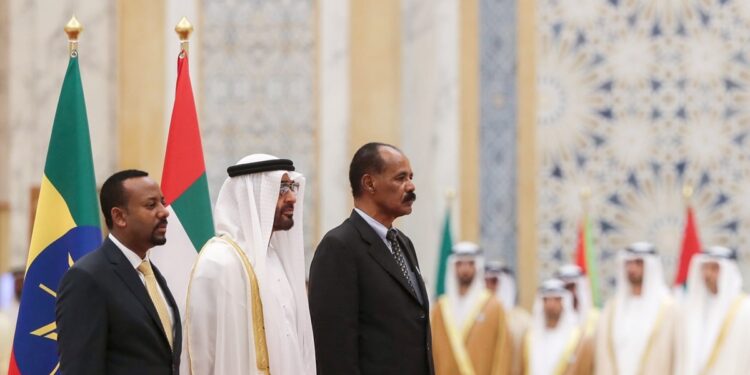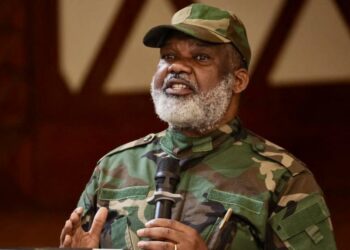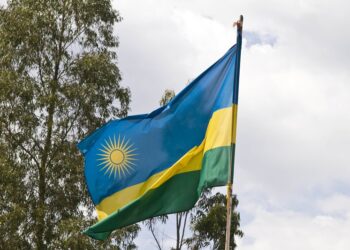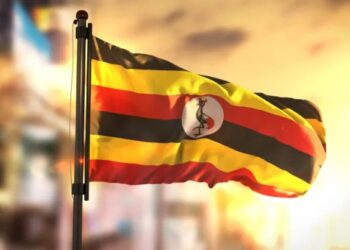The concept of multipolarity is the future of global diplomacy, trade, and politics, as many important global powers are emerging and influencing our world today. The Gulf states are also aware of the importance of the BRICS alliance between the fastest-growing economies in the world, as they need to diversify their economies beyond petroleum. While Africa’s need to be more relevant in global affairs, spreading their tentacles to forge new cooperation to help its booming youth population and attract new investment opportunities, it is important for the continent to engage in developmental ties with economics like the Gulf states. These will be the foundations of sustainable development that reflect the genuineness of vital interests between the states of the Gulf and Africa.
Evidently, media reports suggest that one of the most politicized and debated issues on the current international relations agenda is the type of world order—uunipolar or multipolar. While political specialists from the West conclude that the world is unipolar and will remain so for a long time, presenting this world order formula as an unconditional good for all of humanity, Although the expert’s community and political establishment of Russia, China, and other BRICS countries, and even a number of European Union (EU) member states, opt for the establishment of a more balanced multipolar world, Currently, the Gulf states are understandably unwilling to give up big oil customers like China or disregard China’s new global role and the scale of its influence in the Middle East and the global economy, as represented by the Belt and Road Initiative (BRI). As the establishment of a multipolar international order has drastically altered Africa’s interactions with the rest of the globe, African countries have reached a period of choice. A growing number of “non-traditional actors,” mostly emerging economies from the Global South, are emerging. China, India, the Gulf nations, and Turkey, among others, have used economic and trade sanctions. Diplomacy is used to form alliances and convey a mix of soft and hard power.
Thus, all six Gulf states have relatively well-developed, middle-upper, and upper-income economies. While they have been important to the global economy since the mid-twentieth century, due to their oil exports, in the past two decades or so, they have more actively sought to integrate more deeply into it. While small and dominated by energy exports, the Gulf economies are increasingly well integrated into the international trade and economic system. Whereas Africa is rich in natural resources ranging from arable land, water, oil, natural gas, minerals, forests, and wildlife. The continent holds a huge proportion of the world’s natural resources, both renewables and non-renewables. Besides, some of the first generation of African leaders did choose to experiment with socialism, not necessarily persuaded by the variant in Eastern Europe and China but convinced that the need for rapid development required a prominent role for the state.
“Development” broadly describes the huge needs within newly independent African countries to provide free or subsidized good education, health, jobs, good housing, access to consumer goods, and an improved quality of life. Political scientists have stated that nationalist agitation has generated high expectations among African populations, and the new African leaders were faced not just with the need for economic growth but with an equitable distribution of resources across national populations in ways that met the developmental agenda. However, the astonishing surge in oil prices following the 1973 and 1978–79 shocks saw one side of the Red Sea emerge almost overnight as a global economic powerhouse. In the process, the Gulf States hugely expanded their international influence and became patrons of regimes and rebel movements in the Horn. All states on the other side of the Red Sea were net importers of oil, triggering a balance-of-payments crisis from Cairo to Mogadishu that coincided with economic woes of their own making. The Gulf states have come a long way just in the years since the start of the new millennium, and much further still since Dubai began its experiment in conditional but aggressive state-led globalization in the mid-1980s. To compensate for the deficit, African governments stimulated their citizens to join the expanding labor force in Saudi Arabia, Kuwait, and the UAE so that they could send back remittances. Moreover, they also positioned themselves as deserving recipients of aid and foreign direct investment.
Gulf-Africa and global diplomacy
In recent years, African countries have implemented a series of reforms and better macropolicies and, with some notable exceptions, improved their institutions and governance over the past decades. Religious linkages, anti-piracy cooperation, and investments in vast swathes of fertile agricultural land have long been the primary basis for Gulf State engagement in sub-Saharan Africa. After the Arab Uprisings, when Gulf petrodollars were channeled to front-line states such as Egypt, Jordan, and Syria, there has been a relatively new and deepening strategic relationship between some Gulf States and their counterparts in Africa, especially in the Horn of Africa. The Gulf countries, notably Saudi Arabia, Kuwait, the United Arab Emirates, Qatar, Bahrain, and Oman, have been particularly impacted by the prolonged nature of the COVID-19 pandemic, which drove oil prices to historic lows and exposed their vulnerability to disruptions in global supply chains and overdependence on food imports, according to experts. As a result, economic diversification and food security have emerged as GCC policy priorities that could serve as levers for deepening economic relations with Africa.
Increased cooperation in agriculture and agribusiness, for example, would address food security concerns in the Gulf while raising agricultural productivity and building value chains in Africa along the lines of product development, packaging, and light manufacturing. Analysts have noted that key obstacles limiting bilateral business exchange include burdensome regulations and bureaucracy, as well as a lack of public amenities, inadequate roads that are unable to connect suppliers and manufacturers with retail centers, and a weak digital infrastructure. Meanwhile, Nigeria is a regional power and the largest in Africa. However, in order to boost the country’s real sector and attract value-added investments in trade, education, culture, solid minerals, the digital economy, agriculture, and gas, as well as foster counter-terrorism cooperation, Nigerian President Bola Ahmed Tinubu was on a three-day diplomatic visit to Qatar earlier in March 2024, after an official visit to the Gulf country, which was on invitation of His Highness, Sheikh Tamim bin Hamad Al Thani, Emir of the State of Qatar. Before this, he had visited three other Gulf countries.
Mutual strategic interests and issues
The Gulf states influence in Africa is usually underreported and poorly shadowed in relation to history, diplomacy, military, trade, culture, migration, and education. The shared heritage of the Red Sea region is evident in the monotheistic traditions, from the mystical union of the Jewish Prophet-King Solomon and the Ethio-Yemeni Sheba to the Biblical land of Kush to the first Muslim hijra fleeing persecution in Mecca to Abyssinia and the sounding of the first adhan in Medina by Bilal ibn Rabah, a freed slave from Ethiopia. It also includes the dominance of Semitic languages (Arabic, Amharic, Tigrinya, etc.) and similar tastes in cuisine, dress, and music. Yet other memories, of competing imperialisms and proselytization, are less cheerful reminders of the Gulf-Horn intimacy. Similarly, on the cultural front, Egypt, Kuwait, Oman, Saudi Arabia, the Sudan, and the United Arab Emirates jointly fund the African Islamic Center in Khartoum, Sudan. The Center is crucial to Arab Muslim countries as a vehicle for the propagation and spread of Islam in African countries.
Similarly, Saudi Arabia has been a site of pilgrimage and trade for centuries, a connection that has intensified with the advent of air travel. Investment funds from Kuwait were significant for development agendas in early independent West Africa. Some West African Muslim countries have been members of the World Islamic League (Congress), viewing their membership as a way to bring together religion, Islamic philanthropy, and development. Ahmadu Bello, the Sardauna of Sokoto and premier of the Northern Nigerian regional government from 1960, was a founding member of the World Islamic League and its first vice president. However, African countries have struggled unsuccessfully to diversify their economies from the colonial setting, and the continued centrality of Europe and North America as sources of investment, loans, and grants ensured that despite well-meaning Western rhetoric, the situation did not change. The rise of the Gulf presents African leaders with a familiar choice. As African leaders seek alternatives to dwindling Chinese loans and Western aid, the Gulf’s rise is reshaping geopolitics on the continent.
The Horn of Africa region, one of the clusters of conflict in Africa, is unique in that it is triangularly hemmed by large bodies of water: the Nile River in the west, the Red Sea in the north, and the Indian Ocean in the east. Experts have indicated that the security situation in this sub-region is highly complex due to several socio-economic, political, and geopolitical factors, which range from extreme poverty to maritime insecurity. Still, some Middle Eastern countries, such as the Kingdom of Saudi Arabia (KSA) and the United Arab Emirates (UAE), besides having economic interests, also have religious motivations. Geographical and historical ties, expanding trade partners, and the pursuit of regional and food security are all solid foundations for including partners in the Horn of Africa. Large investments in the region firmly tied several Gulf countries to Africa. The observer says GCC states’ projects in the Horn have been far from straightforward. Many of the infrastructure projects announced in recent years have been slow to materialize.
Propelling economic prosperity
A report indicated that in 2018 alone, the Abu Dhabi Fund for Development also financed more than 66 projects in 28 African countries, valued at US$16.6 billion. Between January 2016 and July 2021, the Emirates invested US$1.2 billion in sub-Saharan Africa, a staggering 88 percent of the GCC total during that period. Before now, Saudi Arabia has also broadened its network of alliances and partnerships. Beyond the above-referenced commitments to the Shanghai Cooperation Organization and BRICS (a collection of countries experiencing rapid economic growth that would, if growth were maintained at similar rates, emerge as the dominant economic players of the 21st century), it has signed up to economic agreements and strategic dialogues with both regional powers and emerging economies in Africa, South America, and Asia. Saudi Arabia has also announced a US$1 billion investment initiative in Africa, focusing on industry, finance, agriculture, fishing, mining, transportation, regional security, and energy. Saudi Arabia, just like the UAE, has also made significant investments in energy and mining projects, and particularly in Africa’s agribusiness, in response to growing food security concerns in the region.
An economic expert suggests that the prospects for deeper economic relations between the Gulf and Africa are further enhanced by the ongoing shift in regional geopolitics. Geopolitical stalemates, pandemic recession, and the U.S. pivot to the Indo-Pacific have pushed the Gulf countries to deprioritize their security posture abroad. While military cooperation may well continue, the interests of Gulf states in Africa will increasingly focus on economic promotion and investment that expands markets and enables long-term diversification. Countries in Africa should pilot their relations with Gulf states; the promise of economic growth and infrastructure development must be balanced against the risks of increased geopolitical tension and internal conflict. Gulf-Africa relations will move forward as analysts say there is a need for building a new business structure that ensures the economic basics for African markets, adopting legislation to regulate economic sectors, and directing the economy towards achieving sustainable strategic goals while providing the necessary infrastructure for business growth and prosperity.
ــــــــــــــــــــــــــــــ
This article expresses the views and opinions of the author and does not necessarily reflect the views of Qiraat Africa and its editors.



























































